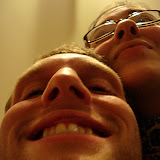


Early morning, about 6:30 a.m., we leave the town of Siranjgonj, Bangladesh and head an hour or so into the countryside. It's still cooler (90 degrees maybe) by the time we arrive at the village where a vaccination camp is taking place. The scene appears to be chaos: cows, sheep, and goats are everywhere, some running freely and others tied to trees or on ropes. Once we step out of the vehicle, all eyes are on us, the foreigners. I try to avoid being pooed or stepped on while my chunky camera and I make our way through the mooing and crowds of people, snapping photos as we go. I have a herd of curious children following me, interested in my every move. One young girl asks me my name in English. We try to make small conversation, and I point to the henna design I see on her palm. She then takes me by the hand and leads me to her home, followed by the crowd. She points to the leaves of a tree and then starts plucking them. "She is going to make the paint for you" says my translator. A little while later she shows up with a plastic bag full of a brownish orange paste that smells like wet leaves. What a wonderful gift! Later I use the paste to paint my toe nails. The photos show the process of mehndi, or henna, first painted on, then set to dry, and last peeled off where it is a brownish orange color and stays on the skin about a week.
I spent 9 days in rural Bangladesh photographing projects supported by Mennonite Central Committee. Most of what we saw had to do with agricultural development (raising animals, growing crops, controlling pests), but we also spent 2 days on an island where MCC is doing HIV/AIDS education.
Try eating with your hand sometime. Notice I say "hand" and not "hands" because it is only proper to eat with the right hand. The left hand is used for the bathroom. Try eating yogurt with your hands, or scooping rice and curried chicken with your hands. This is how we ate in Bangladesh. It felt awfully strange at first, but in a way it was fun. I felt like a child who got to stick their hands in the cake.
One part of MCC's work in Bangladesh that I found particularly interesting was their work with HIV/AIDS on some small islands with fairly conservative Muslim populations. Many people never had sex education in school or heard of HIV/AIDS, but it's important to educate people because Bangladesh is one of the most densely populated countries in the world and an epidemic could spread quickly. Also, many men work as migrant workers and leave home for months at a time, which means they may go to sex workers, which can be dangerous for STDs and AIDS. It was pretty amazing to see that the training is being accepted in the communities, even amoung local Imams (head of the mosques) who are talking about HIV/AIDS in their Friday sermons. You can see more of my photos from the events we saw in my Bangladesh album.
Here's a video clip from when we rode a raft across a river with our motorcycles:



I love the henna Hand pic - beautiful!
ReplyDelete